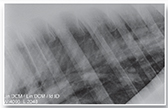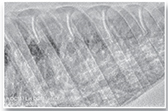 with Elizabeth MacDonald, BVMS, MS Clinical Instructor of Equine Medicine
with Elizabeth MacDonald, BVMS, MS Clinical Instructor of Equine Medicine
Diseases of the respiratory tract are common in horses of all ages. Clinical signs vary from exercise intolerance, respiratory noise, lethargy, enlarged lymph nodes, cough, fever, and nasal discharge. Because many respiratory diseases can look alike when they are in the early stages, an accurate diagnosis is important to ensure the best treatment outcome possible.
Respiratory disease can be classified into infectious and non-infectious causes. Infectious causes can be contagious to other horses and include viral infections like equine herpes virus and equine influenza virus, and bacterial infections like Strangles (Streptococcus equi subspecies equi). Non-infectious causes can be inflammatory in nature and are often caused by exposure to allergens in the horse’s environment.
If a thorough physical exam and routine blood work do not reveal a specific diagnosis, further diagnostics should be considered. Here at the Equine Medical Center, computed tomography (CT) of the head, sinuses and throat, and radiographs of the thorax provide important information about the upper and lower respiratory tracts, respectively. Thoracic ultrasonography is essential to assess the surface of the lungs and detect abnormalities within the pleural space (pleuritis). Resting and dynamic airway endoscopy can identify structural and functional abnormalities of the upper respiratory tract.
Once the source of respiratory disease is determined, laboratory tests can provide a definitive diagnosis. Cultures of samples from the guttural pouches, pleural fluid or from a transtracheal aspirate can confirm bacterial infections and indicate the most appropriate antimicrobial therapy. Microscopic evaluation of lung fluid obtained from a bronchoalveolar lavage can determine the type and severity of non-infectious lung inflammation, so the most cost effective treatments and management changes can be prescribed.
Like many diseases, an early and accurate diagnosis is the first step to ensure the best therapeutic outcome possible. We are happy to work with you and your veterinarian to help make this happen.
For further information about respiratory diagnosis and treatments options at the EMC please call Kathy Ashland at (703) 771 6875
(sponsored content; originally appeared in the February 2018 issue of The Equiery)
 The Marion duPont Scott Equine Medical Center (EMC) is a premier, full-service equine health facility conveniently located at Morven Park in Leesburg, Virginia. As an integral part of the Virginia-Maryland College of Veterinary Medicine and Virginia Tech, the EMC offers an array of cutting-edge diagnostic and therapeutic technologies and veterinary expertise to provide innovative and cost-effective care for your horse. The EMC offers a broad range of general and advanced specialty services by appointment as well as comprehensive 24/7 emergency services. State of the art technology with cutting-edge expertise…
The Marion duPont Scott Equine Medical Center (EMC) is a premier, full-service equine health facility conveniently located at Morven Park in Leesburg, Virginia. As an integral part of the Virginia-Maryland College of Veterinary Medicine and Virginia Tech, the EMC offers an array of cutting-edge diagnostic and therapeutic technologies and veterinary expertise to provide innovative and cost-effective care for your horse. The EMC offers a broad range of general and advanced specialty services by appointment as well as comprehensive 24/7 emergency services. State of the art technology with cutting-edge expertise…
Serving you, your vet and your horse. Ask your vet about us, or visit us yourself!
703-771-6800 • www.vetmed.vt.edu/emc/
You’re Invited: Sign up (name and email address to emcinfo@vt.edu) for EMC’s free equine health alerts and notice of Tuesday Talks, a free, educational seminar series on topics of interest to the horse community. Like us on Facebook to stay informed about the latest advances in equine medicine and health.













